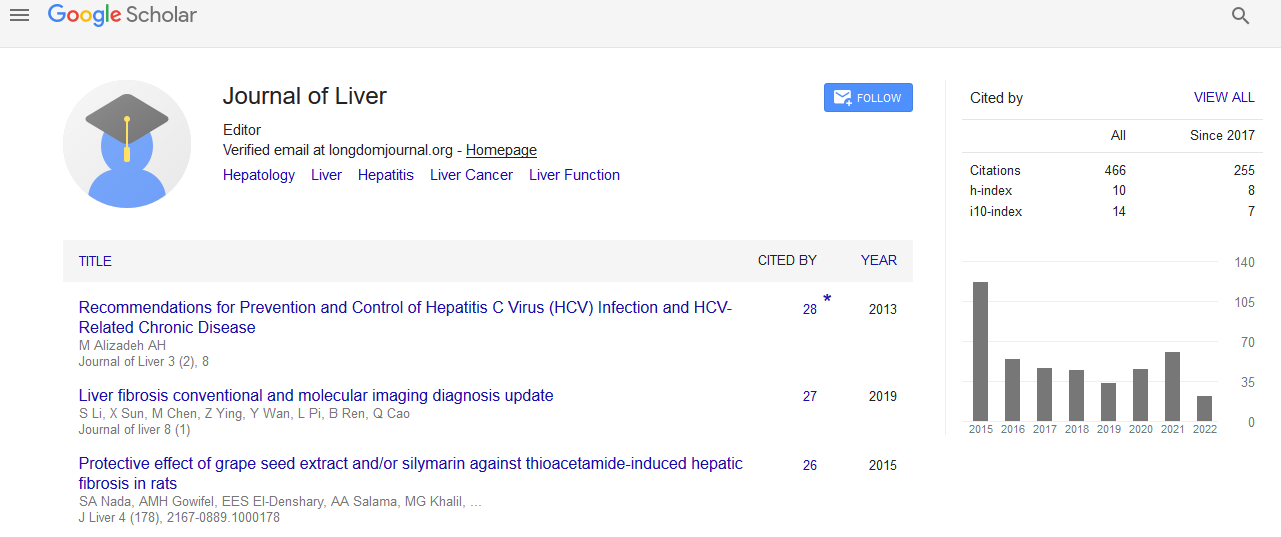PMC/PubMed Indexed Articles
Indexed In
- Open J Gate
- Genamics JournalSeek
- Academic Keys
- RefSeek
- Hamdard University
- EBSCO A-Z
- OCLC- WorldCat
- Publons
- Geneva Foundation for Medical Education and Research
- Google Scholar
Useful Links
Share This Page
Journal Flyer

Open Access Journals
- Agri and Aquaculture
- Biochemistry
- Bioinformatics & Systems Biology
- Business & Management
- Chemistry
- Clinical Sciences
- Engineering
- Food & Nutrition
- General Science
- Genetics & Molecular Biology
- Immunology & Microbiology
- Medical Sciences
- Neuroscience & Psychology
- Nursing & Health Care
- Pharmaceutical Sciences
Using NUCs in prevention of mother-to-child transmission of HBV: To treat or not to treat?
2nd International Conference on Hepatology
May 09-11, 2016 Chicago, USA
Yuming Wang
Third Military Medical University, China
Scientific Tracks Abstracts: J Liver
Abstract:
Mother-to-child transmission (MTCT) of hepatitis B virus (HBV) remains a world concerned question. Despite the administration of HBIG and hepatitis B vaccines after birth, the immunoprophylaxis failure leading to significant MTCT rates ranging from 8% to 32% has been reported among HBeAg positive mothers with high HBV DNA levels. Recently, antiviral drugs, especially nucleoside analogues (NUCs), have been used in clinical studies to prevent perinatal infection. All current oral anti-HBV drugs are FDA pregnancy category C, except telbivudine (LdT) and tenofovir disoproxil (TDF) and emtricitabine (FTC), which are pregnancy category B drugs. Drugs in category B are confirmed safe to fetus in animal reproduction studies, while those in category C are not well defined. LAM was firstly used in HBV-infected mothers, and showed a satisfactory safety profile in late pregnancy. LdT and TDF has potent, specific, and selective anti-HBV activity when administered by an oral route, and no mutagenic, carcinogenic effects, appreciable embryonic or fetal toxic effects were found, especially in women during their reproductive period. In our studies, LdT and TDF have demonstrated a wonderful long-term safety profile in both mothers and their infants. They have also demonstrated an excellent efficacy�??as high as 100%�??in the protection rate of mother-to-infant transmission. Therefore, administration of NUCs therapy to HBV carrier mothers during pregnancy is effective in reducing MTCT. Furthermore, it is known that pregnant women are in an immune allergic status and LdT was reported to have the beneficial functions of immunoregulation in HBV-infected pregnant women.
Biography :
Yuming Wang is currently the Academic Leader in Department of Infectious Diseases, Southwest Hospital, Third Military Medical University in Chongqing. He graduated from Guiyang Medical College and then received his Post-graduate training at Third Military Medical University. He studied in Gifu University in Japan and then in UCSD and Johns Hopkins University. He is mainly devoted to the research on hepatitis B and C. He has been chief editor of 16 monographs, associated editor for 31 monographs and published more than 400 papers, including Gastroenterology, Hepatology and CGH. He received the 2nd Class Award of National Scientific and Technology in 2004.
Email: wym417@163.com

